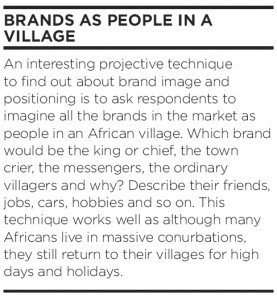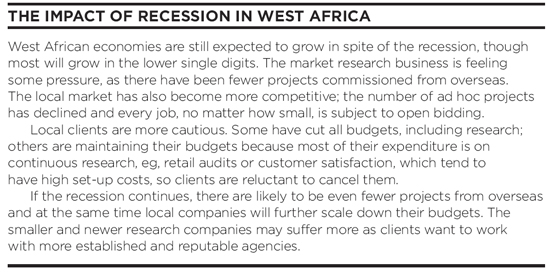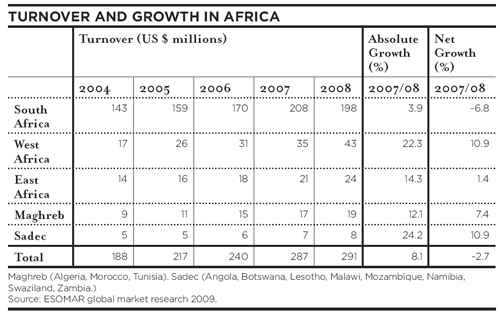Research World November 2009
Carolyn Johnston and Sola Akinnagbe
Religion is an important part of daily life in Africa and impacts not only marketing but market research as well.
‘No phones to heaven,’ a slogan on buses; business names such as ‘Ekenedili Chukwu’ (Thanks be to God) Transport; or ‘Service of God Beauty Parlour’ and bottled water named ‘Holy Water,’ illustrate the importance of religion in Africa. Approximately 46% of Africans are Christian, 41% Muslim; the remaining 13% follow indigenous or other religions. In North Africa and much of Sub-Saharan Africa, the main religion is Muslim; Christians are south of the Sahara.
Many borders in Africa do not take account of tribal or ethnic groups so samples need to be balanced by area, not only because of ethno-geographical and demographic differences, but also because religion influences attitudes and behaviour in each region.
 Planning fieldwork
Planning fieldwork
To allay suspicion of strangers, especially in rural areas, local religious leaders, the Minister or Imam, the Chief or educated people such as the Village Headmaster, are approached before fieldwork begins. The local police may be informed before any house-to-house sampling begins. Without this preparation, interviewers have occasionally been thrown into jail!
Festivities or public holidays usually mean fieldwork is impossible. Weddings and funerals can take from three to seven days and everyone participates. Traditional festivities, eg the Masquerades or Durbars in West Africa, often last several days and businesses close and many people return to their villages during public holidays.
In Africa little interviewing is done by telephone and even less online. 33% of people use a mobile – highest usage (91%) is in South Africa whereas it’s 42% in Nigeria and Kenya. There are very few landlines and reception on both can be terrible with frequent dropped lines.
As for online surveys, despite rapid growth, less than 5% of Africans use the internet; fixed and mobile broadband penetration levels are negligible. In Nigeria, 7% are internet users, but electricity is erratic and cuts are a daily occurrence. This compares to 9% in both Kenya and South Africa. The unreliability of phone lines, low internet penetration and the strong cultural preference for meeting in person, mean that the majority of interviews in Africa are face-to-face.
The impact of religion
Conservative Muslims would be greatly offended if a woman attempted to interview a man or vice versa, so it is essential to match the gender of the interviewer to respondents. Interviewers often work in pairs – one man, one woman and the female interviewer must dress modestly.
It can be difficult to interview Muslim women, as in traditional households men act as gatekeepers and their permission may be required before the female interviewer can talk to the wives. The male interviewer will ask permission of the husband, who may have been introduced by the Imam. Interviews and focus groups take place in respondents’ homes, not in hotels or public places often used elsewhere.
For some people, their product consumption, attitudes and life-style may be at variance with their religious beliefs, eg alcohol consumption or contraception amongst Muslims, Pentecostals and ‘born again’ Christians. Also banking; while Islam is said to forbid usury (interest on loans) most Muslim elites in Nigeria embrace modern banking, though they might deny receiving interest. Tact and sensitivity are crucial. Carefully worded questions, often in third person, or projective techniques, are used to elicit behaviour and attitudes.
Respondents often help recruitment. In Sharia law areas in Nigeria, groups or interviews amongst beer drinkers can only be recruited through referrals. Outlet/café owners deal in the product secretly (to avoid arrest) and won’t easily talk without the support of a trusted customer or friend.
Africa is a vast continent of 53 nations with a population of 991 million. There are many differences between countries, but religion is a critical element of the culture everywhere. It is vital to understand this in order to conduct meaningful market research. The importance of religion, the prevalence of face-to-face interviewing, gaining local religious leaders’ co-operation, sensitivity to customs amongst Muslims and some Christian groups with careful questioning on contentious issues – these all apply throughout Africa.
* Source for phone & ICT figures – International Telecommunications Union, Website: www.itu.int
Sola Akinnagbe is group managing director/CEO of MRC in Lagos and Carolyn Johnston is a consultant with the MRC Group.




